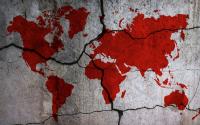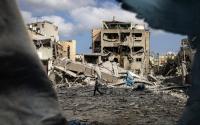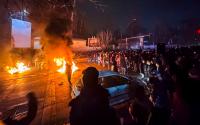Hans von Sponeck22 July, 2002
During the 17 months of the Bush administration just about everything has gone wrong for the US government in preparing the public for military strikes against Iraq. Convincing friendly governments and allies has not fared much better. Acts of terrorism against US facilities overseas and the anthrax menace at home could not be linked to Iraq. Evidence of al-Qaida/lraq collaboration does not exist, neither in the training of operatives nor in support to Ansar-al-Islam, a small fundamentalist group which allegedly harbours al-Qaida elements and is trying to destabilise lraqi Kurdistan.
In the aftermath of the carnage of September 11, the political landscape in the Middle East has changed dramatically. Years of US double standards in dealing with the Palestinian-Israeli conflict have taken a heavy toll. The Arab, Turkish and Kurdish public in the area is wary of facing more turmoil, suffering and uncertainty.
The Beirut summit of the Arab League in March signalled that all 22 governments want to see an end to the conflict with Iraq. Saudi Arabia and Iraq have since reopened their border at Arar and Saudi businessmen are selling their wares in Baghdad. Iraq has agreed to return Kuwait's national archives and to discuss the issue of missing Kuwaitis. Iran and Iraq have accelerated the exchange of refugees. Syria has normalised its relations with Iraq. Lebanon has done the same. Hardly a week passes without Turkish and Jordanian officials and business delegations visiting Iraq. Jordan's national airline flies five times a week between Amman and Baghdad. Airlinks exist between Damascus and Baghdad. Iraqi Kurdistan maintains contacts with Baghdad at scientific, cultural and sports levels and tries to make the best out of its present (albeit tenuous) local stability. Iraq's political and economic isolation in the Middle East is all but over.
A wave of senior US visitors has tried to dislocate these trends towards normalisation and reconciliation in this troubled region. The US administration has put the UN secretary general on a short leash in his meetings with the Iraqi authorities. The only topic worthy of discussion according to the Americans is the return to Iraq of the UN arms inspectors. This became most apparent during the recently concluded talks with the Iraqis in Vienna.
Europe is increasingly uncomfortable with this unilateral insistence on solving the Iraqi conflict militarily. In varying degrees the same applies to countries in the Middle East. Saudi Arabia has served notice that the Sultan air base near Riyadh will not be available for a new US offensive against Iraq. Under severe US pressure, Qatar has agreed to permit the transfer of logistics from Saudi Arabia to its territory. A political crisis is looming in Jordan as a result of US demands to use Jordan as a possible staging area in a war against Iraq. A similar debacle will face the Turkish government once the prime minister, Bulent Ecevit, decides to relinquish his post and fresh elections are scheduled. An entire region is being destabilised to suit American preferences for political change in Iraq.
Concurrently, a systematic dis- and mis-information campaign, one of the biggest ever undertaken by the US authorities, is intensifying. The US and the international public are being sedated daily with increasing doses of propaganda about the threat Iraq poses to the world in 2002. In the forefront of those advocating war against Iraq has been the US deputy secretary of defence, Paul Wolfowitz, who sees a military solution as the only option. On July 14 he stated in Istanbul: "President Bush has made it clear how dangerous the current Iraqi regime is to the United States and that it represents a danger we cannot live with indefinitely."
To make such statements without offering supporting evidence is irresponsible. It promotes government-induced mass hysteria in the US and is meant to garner bipartisan support for military action. A war on Iraq justified by conjecture is politically foolish and morally repugnant. In the words of the Archbishop of Wales, Dr Rowan Williams: "It is deplorable that the world's most powerful nations continue to regard war, and the threat of war, as an acceptable instrument of foreign policy."
The US Department of Defence and the CIA know perfectly well that today's Iraq poses no threat to anyone in the region, let alone in the United States. To argue otherwise is dishonest. They know, for example, that al-Dora, formerly a production centre for vaccine against foot and mouth disease on the outskirts of Baghdad, and al-Fallujah, a pesticide and herbicide manufacturing unit in the western desert, are today defunct and beyond repair. The UN concluded the former had been involved in biological agent research and development and the latter in the production of materials for chemical warfare. UN disarmament personnel permanently disabled al-Dora in 1996. During a visit with a German TV crew to al-Dora in mid-July - a site chosen by me and not the Iraqi authorities - I found it in the same destroyed condition in which I had last seen it in 1999. Al-Fallujah was partially destroyed in 1991 during the Gulf war and again in December 1998, during operation desert fox. In between a UN disarmament team disabled all facilities in any way related to weapons of mass destruction there, including the castor oil production unit. My visit this month disclosed beyond any doubt that the castor oil unit was inoperable. Remnants of other production facilities are used to manufacture herbicides and pesticides for plant protection and household use.
One does not need to be a specialist in weapons of mass destruction to con clude that these sites had been rendered harmless and have remained in this condition. The truly worrying fact is that the US Department of Defence has all of this information. Why then, one must ask, does the Bush administration want to include Iraq in its fight against terrorism? Is it really too far-fetched to suggest that the US government does not want UN arms inspectors back in Iraq? Do they fear that this would lead to a political drama of the first order since the inspectors would confirm what individuals such as Scott Ritter have argued for some time, that Iraq no longer possesses any capacity to produce weapons of mass destruction? This indeed would be the final blow to the "war against Iraq" policy of the Bush administration, a policy that no one else wants. The Iraqis would be well advised to seize this opportunity and open their doors without delay to time-limited arms inspectors, thereby confirming that they indeed have nothing to hide.
This would make a US war against Iraq next to impossible and start the long journey towards the country's return to normality. What was it that Paul Wolfowitz said on the west front of the US Capitol on April 15? "May God bless all the peacemakers in the world." He still has a chance to be among them.
· Hans von Sponeck was the UN humanitarian aid coordinator for Iraq from 1998-2000 and has just returned from a two-week stay in Iraq






